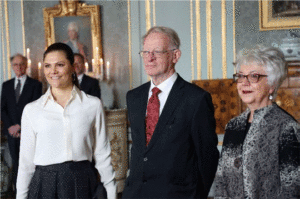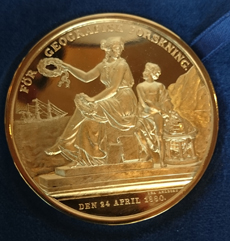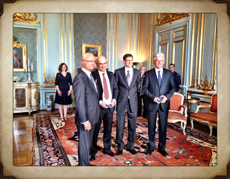SSAG awards the following medal in 2024
The Vega Medal 2025 is awarded to Prof. Marisol de la Cadena, University of California, Davis. Marisol de la Cadena is a Peruvian anthropologist who has made significant contributions to the anthropology of Indigenous peoples and the environment, theoretically situated at the intersection of Science and Technology Studies (STS), feminist theory, and political ecology. Her research spans studies on multi-species (or multi-entity) relations, politics, religion, history, and world anthropologies. Her academic work, published in both Spanish and English, has gained her considerable international recognition, and her theories have inspired anthropologists across the Global South and the Global North, including Sweden. De la Cadena is perhaps best known for her ethnographic research in Latin America, primarily focusing on the cultural and political practices of Indigenous peoples in the Peruvian Andes. Early in her career, she gained attention for her groundbreaking article ”Women Are More Indian: Ethnicity and Gender in a Community Near Cuzco” (1991 in Spanish, 1995 in English), in which she problematizes ethnicity from a gender theory perspective. In her book Indigenous Mestizos (2000), she analyzed how the concepts of race and culture have become intertwined in Peru and how Indigenous communities have fought for recognition and visibility in a racialized society. Her book Earth Beings: Ecologies of Practice Across Andean Worlds (2015) explores how Andean peoples interact with the environment and other non-human entities, particularly in the context of the expansion of neo-extractivism. It also examines how their knowledge and practices challenge Western conceptions of the nature-culture relationship. She has coined the term “onto-epistemic openings” and developed an ethnographic-philosophical method that has contributed to the so-called ontological turn in anthropology. The volume A World of Many Worlds (2018), which she co-edited with philosopher Mario Blaser, investigates the possibilities that emerge from dialogues between Indigenous peoples and the philosophy of science. This book, featuring contributions from scholars such as Alberto Corsín Jiménez, Marianne Lien, Isabelle Stengers, Marilyn Strathern, and Eduardo Viveiros de Castro, explores how diverse knowledges and practices create opportunities for a pluriverse: a cosmos composed of diverging political practices that can coexist. De la Cadena’s latest and ongoing research project, Making Cow, is an anthropological study of the practices, politics, and socio-ecological effects of the cattle industry, based on ethnographic fieldwork in Colombia. Beyond her academic work, de la Cadena has been actively engaged in issues of social justice in Peru and around the world. She has been a prominent voice in public debates advocating for Indigenous rights regarding resource exploitation, megaproject construction, and other environmental and developmental issues. Born and raised in Peru, de la Cadena completed her undergraduate degree in anthropology at Pontificia Universidad Católica del Perú in Lima, followed by advanced studies in France and England. She earned her Ph.D. in anthropology from the University of Wisconsin-Madison in 1996. Since 2010, she has been a professor of anthropology and, since 2017, a professor of STS, both at the University of California, Davis. She is also an affiliated researcher at the University of Western Sydney. As a scholar who has built her career in the Global North, she has consistently worked to build and maintain connections with academia in the Global South through various collegial collaborations and visiting professorships, primarily in Latin America. She has also been an advocate for interdisciplinary collaborations and for anthropology’s role in influencing societal development.
SSAG awards the following medal in 2023
The Vega Medal 2023 goes to John Smol, professor in the Department of Biology and the School of Environmental Studies at Queen’s University in Kingston, Ontario, who together with his research group is recognized as one of the foremost experts on the study of long-term global environmental changes to lakes and rivers, and especially as they relate to many of the most pressing environmental issues, such as the long-term effects of lake eutrophication, acidification, contaminant transport, fisheries management, and a large body of work on climate change with a special focus on the Arctic. John Smol is unquestionably one of the most prolific scientists in paleolimnology, and certainly the most prolific regarding northern lake systems. Professor John P. Smol is the founder and head of the Paleoecological Environmental Assessment and Research Laboratory (PEARL), a group of about 40 researchers and students working throughout the world on a variety of limnological and paleoecological problems. John Smol received his B.Sc. in Marine Biology from McGill University in Montreal in 1977, M.Sc. in limnology from Brock University, Ontario in 1979, and received his Ph.D. in 1982 from Queen’s University. Following post-doctoral work with the Geological Survey of Canada, he joined the faculty at Queen’s University in 1984, and was promoted to Full Professor in 1991. During 2001–2022, he has been the Canada Research Chair in Environmental Change. Together with his research group and a wide-ranging number of collaborators, Smol has an extraordinary publication record with more than 670 journal publications and book chapters, more than 20 books, and more than 1100 conference contributions, including 150 invited keynotes and plenary lectures. He founded and was the editor (1987-2007) of the Journal of Paleolimnology, is editor-in-chief since 2004 of Environmental Reviews, and initiated and has been the series editor for the Developments in Paleoenvironmental Research Series, which currently has 15 volumes. John Smol’s contributions to research and teaching are well recognized, with more than 50 awards coming from a diverse range of organizations, including the North American Lake Management Society, Geological Association of Canada, American Society of Limnology and Oceanography, Royal Society (London), and recognition from other universities in Canada as well as Finland, the UK and China. In 2010 he was named by Nature magazine as Canada’s Top Mid-career Scientific Mentor, and because of the importance of his research focused on understanding the effects of global climate and environmental changes, especially across the arctic landscape, Canadian Geographic magazine in 2013 named John Smol as one of nine ‘Canadians changing our world’. In 2018 John Smol was inducted as a Fellow of the Royal Society (UK) and in 2019 received the Polar Medal in Canada for “extraordinary services in the polar regions and Canada’s north”. Currently he is President the of the Academy of Science, Royal Society of Canada.
SSAG awards the following medal in 2022
SSAG’s Medal in Gold 2022 is awarded to Thomas Hylland Eriksen, professor of social anthropology at the University of Oslo, for his significant contribution to anthropological research and his central role as a mediator of anthropological perspectives in the social debate.
SSAG awards the following medal in 2021
The 2021 Vega Medal is awarded to Anssi Ilmari Paasi, professor of geography at the University of Oulu (Oulun Yliopisto), Finland, for his significant contribution to geographical research, particularly his critical renewal and broadening of political geography.
SSAG awards the following medals in 2020
The Vega Medal to Professor David R. Montgomery, Department of Earth and Space Sciences, University of Washington, Seattle, USA, for his great efforts in physical geography, especially for his efforts in the geomorphological field.
The Johan August Wahlberg Medal in Gold to Professor Emeritus Margareta Ihse, Stockholm University, and to Professor Emeritus Karna Lidmar-Bergström, Stockholm University, for their respective major and pioneering contributions to research in physical geography.
SSAG awards the following medal in 2019
The SSAG’s Medal in Gold to Professor Emily Martin, New York University, USA, for her contributions to anthropology in a long row of influential books and articles.
SSAG awarded the following medals in 2018

In 2018 HRH Crown Princess Victoria handed out the Johan August Wahlberg Medal in Gold to Professor Emeritus Arild Holt-Jensen and the Vega Medal to Professor Gillian Hart.
The Vega Medal to Professor Gillian Hart, University of California, Berkeley, USA. Professor Emerita Hart has established a worldwide reputation as one of human geography’s leading thinkers: an unrivalled expert on the dialectic of global and local change, on how this dialectic plays out in the rural regions of Southern Africa and Southeast Asia, and on the Gramscian political-economic theory to which she has often turned to understand these issues. Professor Emerita Hart is a world-renowned expert on questions of gender, race and power that she has explored through critical engagements with labor studies, development studies, and agrarian and regional studies.
The Johan August Wahlberg Medal in Gold to Professor Emeritus Arild Holt-Jensen, Department of Geography, University of Bergen, Norway, for his holistic view of geography as science with its applications for urban and regional planning.
SSAG awarded the following medal in 2017
The Vega Medal to Professor Tandong Yao, director of the Institute of Tibetan Plateau Research at the Chinese Academy of Sciences (CAS), Beijing, China, and director of the CAS Center for Excellence in Tibetan Plateau Earth Sciences. Professor Yao gets the prize for his outstanding contribution to glacier research and to the society at large.
SSAG awarded the following medal in 2016
The SSAG Medal in Gold to Didier Fassin, James D. Wolfensohn Professor of Social Science, Institute for Advanced Study, Princeton, USA. Based on medical anthropology Professor Fassin has extended his research to an overall humanitarian anthropology that has come to focus on vulnerable groups and the social institutions that makes them vulnerable.
SSAG awarded the following medal in 2015
The Vega Medal to Lesley Head, Distinguished Professor of Geography at the Australian Centre for Cultural Environmental Research, University of Wollongong, Wollongong, Australia. Professor Head gets the prize for her contributions to the broad science of cultural geography.
SSAG awarded the following medals in 2014
The Vega Medal to Compton James Tucker, Senior Earth Scientist at NASA Goddard Space Flight Center, Greenbelt, USA and Adjunct Professor at the Department of Geographical Sciences, University of Maryland, College Park, USA. He is awarded the medal for his contributions to the geographical research discipline of remote sensing.
The Johan August Wahlberg Medal in Gold to Guðrún Gísladóttir, Professor of Geography at the School of Engineering and Natural Sciences, University of Iceland, Reykjavik, Iceland. Professor Gísladóttir gets the prize for her contributions to our understanding of land degradation and desertification.
SSAG awarded the following medals in 2013
The Sven Hedin Medal in Gold to Håkan Wahlquist for his contributions to Central and South Asian research history and anthropology and especially for his research on Sven Hedin’s discovery and research expeditions.
Anders Retzius’ Medal in Gold to Paul Stoller, professor of anthropology at West Chester University, Pennsylvania, USA.
SSAG awarded the following medals in 2012
Anders Retzius’ Medal in Gold to Don Mitchell, Syracuse, USA.
Johan August Wahlberg’s Medal in Gold to Dieter Soyez, Köln, Tyskland.
Johan August Wahlberg’s Medal in silver to Anders Fridfeldt, Stockholm.
SSAG awarded the following medals in 2011
The Vega Medal to Terry Callaghan who is professor of Arctic Ecology at the University of Sheffield. He has throughout his career been able to show the need for specialist knowledge of how terrestrial ecosystems respond to changes in ultraviolet radiation and climate change to be able to make predictions of change from a broad geographic perspective. He has led several international research projects, networks and environmental assessments, including Arctic Climate Research Assessment (ACIA). Since 1996, professor Callaghan has been the director of the Abisko Scientific Research Station, and thus been employed by the Royal Swedish Academy of Sciences, until recently when the station was taken over by the Swedish Polar Research Secretariat. Terry Callaghan has over ten years led the network Scandinavian – North European Network of Terrestrial Field Bases (SCANNET), which is a network of Arctic research stations. He recently managed to get EU funding for a major project called the International Network for Terrestrial Research and Monitoring in the Arctic (INTERACT) within which research and monitoring at 34 research stations spread across several geographic regions in the Arctic will be linked together.
Johan August Wahlberg Medal in Gold to Professor Carole Crumley whose research focus is historical ecology and landscape archeology. In a unique way, She combines knowledge of quaternary geology, geography, ecology, anthropology, and archeology. With her research professor Crumley clearly shows how knowledge, within the sciences that SSAG support, can be linked together in research projects whose results are important for the development of a sustainable society. In the past two years, she has been a guest researcher at the Stockholm Resilience Centre.
Earlier
Earlier medalists (pdf)

